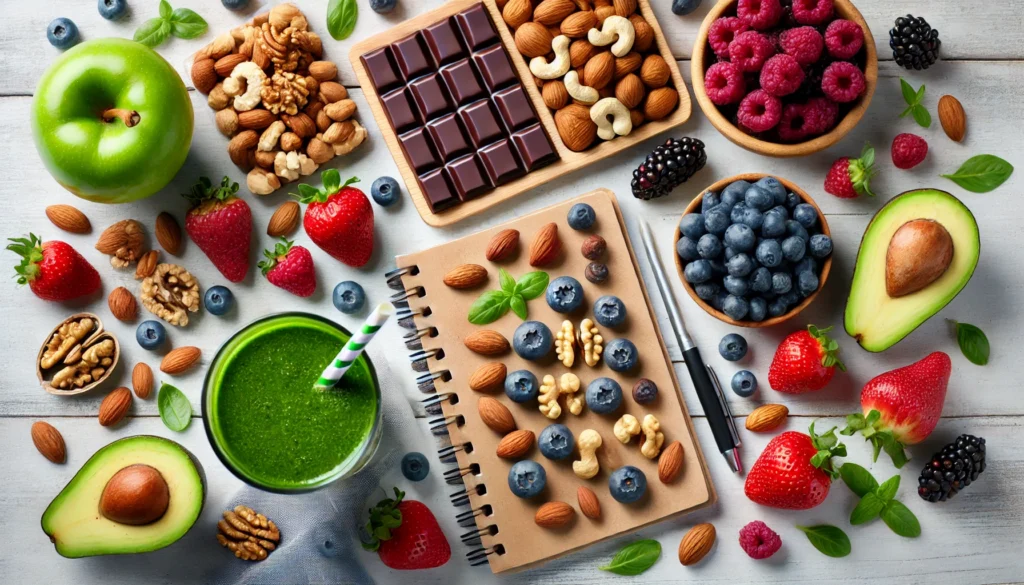In an age where mental acuity and sustained focus are invaluable assets, understanding the role of diet in cognitive performance is paramount. The modern lifestyle, with its fast-paced demands, often leaves individuals feeling mentally drained. However, the solution may lie in something as simple as the food we consume. This article explores the best foods for energy and concentration, offering insights into how certain nutrients can boost alertness and mental clarity.
You may also like: Memory-Boosting Foods You Should Try Today
The Science Behind Food and Focus
Before diving into specific foods, it’s essential to understand the science linking diet to mental focus. The brain, despite its small size relative to the rest of the body, is a voracious consumer of energy. It requires a steady supply of glucose, which is derived from the carbohydrates we consume. However, not all carbohydrates are created equal; complex carbohydrates provide a more sustained energy release compared to simple sugars.
Brain’s Energy Requirements
The brain’s energy demands are immense, accounting for approximately 20% of the body’s total energy expenditure. This energy is primarily used for maintaining neural activity and supporting cognitive functions. Therefore, a constant supply of energy is crucial for optimal brain performance.
The Role of Glucose
Glucose acts as the primary fuel for the brain, influencing memory, learning, and overall cognitive function. The type of carbohydrates consumed impacts how glucose is delivered to the brain. Complex carbohydrates found in whole grains and legumes break down slowly, providing a steady energy supply, whereas simple sugars cause rapid spikes and crashes in blood sugar levels.
Essential Nutrients for Brain Health
Apart from glucose, the brain relies on various nutrients to function effectively. Omega-3 fatty acids, antioxidants, vitamins, and minerals are critical for maintaining cognitive health. They support neuron integrity, enhance synaptic plasticity, and reduce inflammation, all of which are essential for sustained mental focus.
Historical Context of Brain Foods
Throughout history, various cultures have recognized the importance of diet in cognitive function. Ancient civilizations, such as the Greeks and Chinese, utilized herbs and specific foods to enhance mental capabilities. The Mediterranean diet, rich in fish, nuts, and olive oil, is a testament to the age-old understanding of food’s impact on mental health.
Ancient Practices and Beliefs
In ancient Greece, scholars like Hippocrates emphasized the relationship between food and health. Herbs such as ginkgo biloba and rosemary were praised for their cognitive-enhancing properties. Similarly, Traditional Chinese Medicine incorporated ginseng and green tea to bolster brain function.
The Mediterranean Diet’s Influence
The Mediterranean diet, renowned for its heart health benefits, also supports cognitive function. Its emphasis on whole foods, healthy fats, and plant-based ingredients provides a balanced intake of essential nutrients. Studies have linked this diet to reduced risks of cognitive decline and improved mental acuity.
Modern Scientific Validation
Recent scientific research has validated many of these traditional beliefs. Studies have demonstrated the positive effects of certain foods and nutrients on brain health, lending credence to historical practices. This fusion of ancient wisdom and modern science continues to guide dietary recommendations for cognitive enhancement.
Best Foods for Energy and Concentration
Fatty Fish
Fatty fish, including salmon, mackerel, and sardines, are excellent sources of omega-3 fatty acids. These essential fats are integral to brain health, promoting better memory and improved mood. Omega-3s enhance synaptic plasticity, facilitating efficient communication between neurons, which is vital for learning and memory.
Omega-3 Fatty Acids and Synaptic Function
Omega-3 fatty acids, particularly EPA and DHA, are vital for maintaining the fluidity of cell membranes. This fluidity is crucial for synaptic function, as it allows for efficient neurotransmitter release and reception, enhancing communication between brain cells.
Mood and Cognitive Benefits
Consuming omega-3-rich fish has been linked to improved mood and reduced symptoms of depression. These fatty acids support the production of neurotransmitters like serotonin, which play a key role in mood regulation and cognitive performance.
Sustainable Seafood Choices
While fatty fish provide substantial cognitive benefits, it’s essential to choose sustainably sourced options. Overfishing and environmental concerns necessitate mindful consumption practices, ensuring that future generations can also benefit from these brain-boosting foods.
Blueberries
Blueberries are often heralded as a superfood, and for a good reason. They are packed with antioxidants, particularly flavonoids, which have been shown to improve cognitive function. Antioxidants combat oxidative stress, a process that can damage brain cells and impair cognitive functions.
Flavonoids and Cognitive Enhancement
Flavonoids, the primary antioxidants in blueberries, cross the blood-brain barrier and localize in areas involved in learning and memory. They stimulate the production of brain-derived neurotrophic factor (BDNF), which supports neurogenesis and synaptic growth.
Reducing Oxidative Stress
Oxidative stress results from an imbalance between free radicals and antioxidants in the body. Blueberries’ high antioxidant content helps neutralize free radicals, protecting brain cells from damage and preserving cognitive function.
Incorporating Blueberries into Your Diet
To maximize their cognitive benefits, include blueberries in your daily diet. They can be enjoyed fresh, frozen, or dried, and incorporated into smoothies, yogurts, or oatmeal for a nutritious brain-boosting snack.
Nuts and Seeds
Nuts and seeds, such as walnuts, almonds, and flaxseeds, are powerhouses of brain-boosting nutrients. They are rich in vitamin E, which protects against cognitive decline as we age. Additionally, these foods contain essential fatty acids and plant compounds that support brain health.

Vitamin E and Cognitive Protection
Vitamin E is a potent antioxidant that protects brain cells from oxidative damage. Studies have linked higher vitamin E intake to a reduced risk of Alzheimer’s disease and cognitive decline, highlighting its importance in maintaining brain health.
Fatty Acids and Neuroprotection
Nuts and seeds are excellent sources of alpha-linolenic acid (ALA), a type of omega-3 fatty acid. ALA supports brain structure and function, offering neuroprotective benefits that enhance cognitive performance.
Versatile Dietary Options
Incorporating nuts and seeds into your diet is easy and versatile. They can be added to salads, used as toppings for cereals, or enjoyed as a standalone snack. With a variety of options available, it’s simple to find nuts and seeds that suit your taste preferences.
Dark Chocolate
For those with a sweet tooth, dark chocolate offers a delicious way to boost brain function. It contains flavonoids, caffeine, and antioxidants, which collectively enhance memory, focus, and overall cognitive performance. However, moderation is key to reaping the benefits without excess sugar intake.
The Role of Flavonoids in Brain Health
Flavonoids in dark chocolate improve blood flow to the brain, supporting cognitive function. They enhance the formation of new neurons and promote neuroplasticity, which is essential for learning and memory retention.
Caffeine and Alertness
Dark chocolate contains small amounts of caffeine, a well-known stimulant that enhances alertness and attention. Combined with flavonoids, caffeine in dark chocolate can provide a quick boost in cognitive performance without the jitters associated with coffee.
Choosing Quality Dark Chocolate
To maximize the cognitive benefits, choose dark chocolate with at least 70% cocoa content. This ensures a higher concentration of flavonoids and antioxidants while minimizing sugar content. Enjoy in moderation to balance indulgence with health benefits.
Leafy Greens
Leafy greens like spinach, kale, and broccoli are abundant in vitamins and minerals that support brain health. They are particularly high in vitamin K, lutein, and folate, which have been associated with slower cognitive decline.
Vitamin K and Cognitive Function
Vitamin K plays a crucial role in brain cell maintenance and repair. It supports the synthesis of sphingolipids, a class of compounds essential for brain structure and function, contributing to improved cognitive performance.
Lutein’s Neuroprotective Effects
Lutein, a carotenoid found in leafy greens, accumulates in the brain and protects against age-related cognitive decline. It acts as an antioxidant, reducing inflammation and oxidative stress, thereby preserving cognitive abilities.
Incorporating Leafy Greens into Meals
Leafy greens can be easily added to meals for a nutritional boost. Include them in salads, smoothies, or as a side dish to enhance your diet with brain-healthy nutrients. Regular consumption can support long-term cognitive health.
Whole Grains
Whole grains provide a steady supply of glucose to the brain, ensuring sustained energy levels throughout the day. Foods like oatmeal, quinoa, and whole-grain bread are excellent choices for maintaining concentration and mental acuity.
The Benefits of Complex Carbohydrates
Complex carbohydrates in whole grains break down slowly, providing a gradual release of glucose into the bloodstream. This steady supply prevents energy crashes, supporting sustained focus and cognitive performance throughout the day.
Fiber and Brain Health
Whole grains are rich in dietary fiber, which supports gut health and indirectly influences brain function. A healthy gut microbiome produces short-chain fatty acids that have neuroprotective effects, highlighting the gut-brain connection.
Diverse Whole Grain Options
Incorporate a variety of whole grains into your diet to enjoy their cognitive benefits. Experiment with different grains like brown rice, barley, or bulgur to diversify your meals and support brain health.
Avocados
Avocados are rich in healthy monounsaturated fats, which support healthy blood flow to the brain. They also contain vitamin E and folate, nutrients that enhance cognitive function and protect against cognitive decline.
Monounsaturated Fats and Brain Circulation
Monounsaturated fats in avocados improve blood circulation, ensuring an adequate supply of oxygen and nutrients to the brain. This supports cognitive function and enhances mental clarity and focus.
Folate’s Role in Cognitive Health
Folate, a B-vitamin found in avocados, is essential for neurotransmitter synthesis and DNA repair. Adequate folate intake supports cognitive function and reduces the risk of neurodegenerative diseases.
Creative Ways to Enjoy Avocados
Avocados can be incorporated into various dishes, from salads and sandwiches to smoothies and spreads. Their creamy texture and mild flavor make them a versatile addition to any meal, providing both taste and cognitive benefits.
Current Trends in Brain-Boosting Diets
The rise of biohacking and the quest for cognitive enhancement have brought renewed interest in brain-boosting diets. Ketogenic diets, nootropics, and intermittent fasting are among the trends gaining traction for their potential cognitive benefits.

Ketogenic Diet and Mental Clarity
The ketogenic diet, which emphasizes high-fat and low-carbohydrate intake, is believed to offer neuroprotective benefits. By shifting the body’s primary energy source from glucose to ketones, it may enhance mental clarity and focus.
The Science of Ketosis
Ketosis, the metabolic state induced by the ketogenic diet, produces ketones as an alternative energy source for the brain. Ketones provide a more stable and efficient energy supply, supporting cognitive function and reducing mental fatigue.
Neuroprotective Effects of Ketones
Research suggests that ketones have anti-inflammatory and neuroprotective properties, potentially reducing the risk of neurodegenerative diseases. These effects contribute to improved mental clarity and sustained cognitive performance.
Considerations for Adopting a Ketogenic Diet
While the ketogenic diet offers cognitive benefits, it may not be suitable for everyone. Consider factors such as individual health conditions, dietary preferences, and lifestyle before making significant dietary changes.
Nootropics: Cognitive Enhancers
Nootropics, substances that enhance cognitive function, are also becoming popular. While some are naturally found in foods, such as caffeine and L-theanine in tea, others are available as supplements.
Natural Nootropics in Foods
Certain foods contain natural nootropics that support cognitive function. For example, caffeine in coffee and L-theanine in green tea improve focus and relaxation, providing a balanced cognitive boost.
Supplementing with Nootropics
For those seeking additional cognitive enhancement, nootropic supplements are available. These supplements often contain a combination of compounds designed to improve memory, focus, and overall brain health.
Safety and Efficacy Considerations
When considering nootropic supplements, prioritize safety and efficacy. Research the ingredients and consult with healthcare professionals to ensure they are appropriate for individual needs and health conditions.
Intermittent Fasting and Brain Health
Intermittent fasting, a dietary approach involving cycles of fasting and eating, has gained popularity for its potential cognitive benefits. It is believed to enhance brain health by promoting cellular repair and reducing inflammation.
The Mechanisms of Intermittent Fasting
Intermittent fasting triggers autophagy, a process where the body removes damaged cells and generates new ones. This cellular renewal supports brain health and may improve cognitive function and longevity.
Cognitive Benefits of Fasting
Studies suggest that intermittent fasting may enhance memory, improve learning, and protect against age-related cognitive decline. These benefits are attributed to reduced inflammation and improved insulin sensitivity.
Implementing Intermittent Fasting
When adopting intermittent fasting, choose a method that fits your lifestyle, such as the 16:8 or 5:2 approach. Gradually adjust to fasting periods and prioritize nutrient-dense meals during eating windows for optimal cognitive support.
Future Implications and Considerations
As research continues to uncover the intricate relationships between diet and cognitive function, the potential for dietary interventions in enhancing mental focus will likely grow. Personalized nutrition, tailored to individual genetic profiles, may become a cornerstone of cognitive health in the future.
Advances in Nutritional Genomics
Nutritional genomics explores how individual genetic variations affect nutrient metabolism and dietary needs. By understanding these genetic influences, personalized nutrition plans can be developed to optimize cognitive health and performance.
Tailoring Diets to Genetic Profiles
Personalized nutrition involves tailoring dietary recommendations to an individual’s genetic makeup. This approach considers factors such as nutrient absorption, metabolism, and predisposition to certain health conditions, providing targeted cognitive support.
Potential Challenges and Opportunities
While personalized nutrition offers promising benefits, it presents challenges such as accessibility, cost, and ethical considerations. Addressing these challenges will be crucial for widespread adoption and equitable access to personalized dietary interventions.
The Role of Technology in Cognitive Nutrition
Technological advancements are revolutionizing the field of cognitive nutrition. From wearable devices that monitor brain activity to apps that provide personalized dietary recommendations, technology is empowering individuals to optimize their cognitive health.
Wearables and Cognitive Monitoring
Wearable devices equipped with sensors can track brain activity, providing real-time insights into cognitive performance. These devices enable individuals to make informed dietary choices that align with their cognitive needs and goals.
Apps and Digital Platforms
Digital platforms offer personalized dietary guidance based on individual preferences and health goals. These tools utilize data analytics and machine learning to provide tailored recommendations, supporting cognitive enhancement and overall well-being.
Ethical Considerations in Cognitive Tech
As technology advances, ethical considerations surrounding data privacy, consent, and accessibility must be addressed. Ensuring ethical practices will be essential for building trust and promoting responsible use of cognitive-enhancing technologies.
Practical Advice for Incorporating Brain Foods
To harness the power of these enriching foods, consider the following tips:
- Start Small: Gradually incorporate these foods into your diet. Begin with a few servings per week and increase as desired.
- Stay Consistent: Consistency is key to reaping the cognitive benefits. Aim for a balanced diet that includes a variety of brain-boosting foods.
- Hydrate: Don’t forget the importance of hydration. Dehydration can impair cognitive function, so ensure adequate water intake alongside a nutritious diet.
Gradual Integration of Brain Foods
Begin by introducing one or two brain-boosting foods into your diet each week. This gradual approach allows your body to adjust to dietary changes and helps establish sustainable habits for long-term cognitive health.
Maintaining Dietary Consistency
Consistency is essential for maximizing the cognitive benefits of brain foods. Create a meal plan that incorporates a variety of nutrient-rich foods, ensuring a balanced intake of essential vitamins and minerals.
The Importance of Hydration
Proper hydration is crucial for cognitive function, as even mild dehydration can impair concentration and memory. Aim to drink at least eight glasses of water daily, and consider herbal teas or infused water for variety.
Conclusion
In conclusion, the foods we choose to nourish our bodies directly impact our mental performance. By prioritizing a diet rich in omega-3 fatty acids, antioxidants, and essential vitamins, individuals can enhance their mental focus and sustain energy levels. As trends in cognitive enhancement evolve, staying informed and making conscious dietary choices will be paramount in optimizing brain health.
For health and wellness coaches, science journalists, and biohackers alike, understanding the role of diet in cognitive function is a valuable asset. By sharing this knowledge, they can empower others to make informed choices that enhance mental clarity and overall well-being.
Empowering Through Education
Educating others about the connection between diet and cognitive function is a powerful tool for promoting brain health. By sharing evidence-based information and practical tips, individuals can make informed dietary choices that support cognitive performance.
The Future of Cognitive Nutrition
As research advances, the field of cognitive nutrition will continue to evolve, offering new insights and opportunities for optimizing brain health. Staying informed about emerging trends and scientific discoveries will be essential for making the most of dietary interventions.

Embracing a Holistic Approach
A holistic approach to cognitive health considers not only diet but also factors such as exercise, sleep, and stress management. By addressing these interconnected aspects of well-being, individuals can achieve optimal cognitive function and overall quality of life.
Further Reading:
10 ‘Energy Foods’ That’ll Keep You Alert, Awake and Excited to Work Out
Eating for Energy: Foods That Fight Fatigue
13 healthy ways to stay awake at work that aren’t just coffee, coffee and coffee
Important Note: The information contained in this article is for general informational purposes only, and should not be construed as health or medical advice, nor is it intended to diagnose, prevent, treat, or cure any disease or health condition. Before embarking on any diet, fitness regimen, or program of nutritional supplementation, it is advisable to consult your healthcare professional in order to determine its safety and probable efficacy in terms of your individual state of health.
Regarding Nutritional Supplements Or Other Non-Prescription Health Products: If any nutritional supplements or other non-prescription health products are mentioned in the foregoing article, any claims or statements made about them have not been evaluated by the U.S. Food and Drug Administration, and such nutritional supplements or other health products are not intended to diagnose, treat, cure, or prevent any disease.


